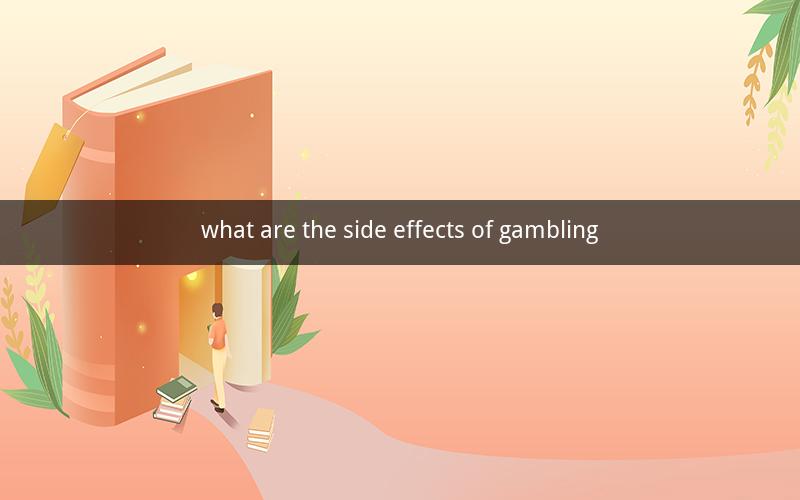
Table of Contents
1. Introduction to Gambling
2. Understanding Side Effects
3. Psychological Side Effects
- Depression and Anxiety
- Compulsive Behavior
- Suicidal Thoughts
4. Financial Side Effects
- Financial Ruin
- Debt and Borrowing
- Loss of Savings
5. Social Side Effects
- Relationship Strain
- Isolation and Loneliness
- Family Disruption
6. Legal and Ethical Side Effects
- Legal Consequences
- Ethical Concerns
7. Prevention and Treatment
- Identification of Risk Factors
- Support Groups and Counseling
- Professional Help
8. Conclusion
1. Introduction to Gambling
Gambling, an activity that involves risking money or something of value on an event with an uncertain outcome, has been a part of human culture for centuries. While it can be a form of entertainment for some, it is crucial to recognize the potential side effects that can arise from excessive or compulsive gambling.
2. Understanding Side Effects
The side effects of gambling can manifest in various domains of life, including psychological, financial, social, and legal/ethical aspects. It is essential to understand these effects to address and mitigate their impact on individuals and society.
3. Psychological Side Effects
Gambling can have profound psychological effects on individuals. Some of the most common psychological side effects include:
- Depression and Anxiety: The stress and anxiety associated with gambling can lead to depression, as individuals may feel overwhelmed by their losses and the pressure to continue gambling.
- Compulsive Behavior: Compulsive gambling, also known as problem gambling, is characterized by an inability to control gambling behavior, leading to significant distress and impairment in various areas of life.
- Suicidal Thoughts: In severe cases, the psychological strain of gambling can lead to suicidal thoughts, as individuals may feel trapped and unable to escape their addiction.
4. Financial Side Effects
The financial impact of gambling can be devastating. Some of the financial side effects include:
- Financial Ruin: Excessive gambling can lead to the depletion of savings, the sale of assets, and the accumulation of debt.
- Debt and Borrowing: Individuals may turn to borrowing money to fund their gambling habits, leading to a cycle of debt that can be difficult to break.
- Loss of Savings: Many individuals who gamble excessively may lose their savings, which can have long-term consequences for their financial stability.
5. Social Side Effects
Gambling can also have significant social implications. Some of the social side effects include:
- Relationship Strain: The stress and financial burden of gambling can strain relationships, leading to conflict and even the breakdown of marriages and families.
- Isolation and Loneliness: Individuals who are struggling with gambling may withdraw from social activities and relationships, leading to isolation and loneliness.
- Family Disruption: The consequences of gambling can disrupt family life, causing emotional and financial turmoil for all members.
6. Legal and Ethical Side Effects
Gambling can also have legal and ethical implications. Some of the concerns include:
- Legal Consequences: Engaging in illegal gambling activities can lead to legal consequences, including fines and imprisonment.
- Ethical Concerns: The exploitation of vulnerable individuals and the potential for gambling-related harm raise ethical questions about the morality of certain gambling practices.
7. Prevention and Treatment
To address the side effects of gambling, it is essential to take preventive and treatment measures. Some of the strategies include:
- Identification of Risk Factors: Identifying individuals who are at risk of developing gambling problems can help in implementing early intervention strategies.
- Support Groups and Counseling: Support groups and counseling can provide individuals with the tools and support they need to overcome their gambling addiction.
- Professional Help: Seeking help from mental health professionals can be crucial in treating gambling-related issues.
8. Conclusion
Gambling, while a popular form of entertainment, can have significant side effects on individuals and society. Understanding these side effects is crucial in addressing and mitigating their impact. By implementing preventive and treatment measures, we can help individuals overcome their gambling problems and lead healthier, more fulfilling lives.
Questions and Answers
1. Q: What are the most common psychological side effects of gambling?
A: The most common psychological side effects include depression, anxiety, compulsive behavior, and suicidal thoughts.
2. Q: How can excessive gambling affect a person's financial situation?
A: Excessive gambling can lead to financial ruin, debt, and the loss of savings.
3. Q: What are the social consequences of problem gambling?
A: The social consequences include relationship strain, isolation, loneliness, and family disruption.
4. Q: Can gambling have legal implications?
A: Yes, engaging in illegal gambling activities can lead to legal consequences such as fines and imprisonment.
5. Q: How can individuals identify if they have a gambling problem?
A: Individuals can identify a gambling problem if they experience cravings, the inability to control their gambling behavior, and negative consequences in their personal and professional lives.
6. Q: What are some treatment options for gambling addiction?
A: Treatment options include support groups, counseling, and professional help from mental health professionals.
7. Q: How can families support a loved one with a gambling problem?
A: Families can support their loved ones by offering empathy, seeking professional help, and setting boundaries to protect themselves from financial and emotional harm.
8. Q: What role does society play in preventing gambling-related harm?
A: Society can play a role by implementing regulations, providing education on the risks of gambling, and offering support services for individuals struggling with gambling addiction.
9. Q: Can gambling addiction be cured?
A: While there is no cure for gambling addiction, it can be effectively managed with proper treatment and support.
10. Q: How can individuals protect themselves from the negative effects of gambling?
A: Individuals can protect themselves by setting limits on their gambling activities, seeking support when needed, and being aware of the potential risks associated with gambling.